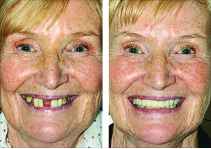 Frequently patients come into our office complaining of difficulty chewing. I am not referring to painful chewing, but difficulty due to missing teeth. Unfortunately, patients often look at their teeth in a very different fashion than the rest of their body. Many patients will have teeth removed without replacing them, with the thought that there are many more in the mouth that can be used to chew. These patients often will allow this to occur with multiple teeth which ultimately leads to problems with chewing or speech.
Frequently patients come into our office complaining of difficulty chewing. I am not referring to painful chewing, but difficulty due to missing teeth. Unfortunately, patients often look at their teeth in a very different fashion than the rest of their body. Many patients will have teeth removed without replacing them, with the thought that there are many more in the mouth that can be used to chew. These patients often will allow this to occur with multiple teeth which ultimately leads to problems with chewing or speech.
What Occurs:
As teeth are removed or lost, a number of issues can occur over time. Research has demonstrated that approximately 25% of the jaw bone in the area can be lost within the first year of tooth removal. This loss will likely continue at a slower rate indefinitely. This change in bone structure might impact the neighboring teeth on either side causing bone loss (and support loss) to these teeth as well.
Remaining teeth can shift over time due to the loss of teeth and supporting bone structure. This shifting can change the way you bite. In fact, if you remove a tooth but still have an opposing tooth (i.e.- remove an upper molar while still having the lower molar below), it is possible that this tooth will grow out of the bone (as if it were trying to reach to contact something).
Any of these issues can significantly alter the way we chew, speak or look.
What Can Be Done Right Away:
Addressing the loss of teeth can be done a number of ways. One of the most important things to consider immediately is having your surgeon place a bone graft (typically a powder) in the area the tooth or teeth are being removed at the time of the procedure. The placement of this graft can help slow or prevent bone loss in the area. In addition, it may help preserve the jaw bone for future tooth replacement options such as a dental implant. This grafting can often be performed at the same time tooth replacement procedures such as dental implants are being performed.
Options:
A variety of options exist when considering tooth replacement. Some patients opt for a removable denture. This device can fill in the spaces where a missing tooth or teeth are located. A removable denture typically is composed of acrylic (or another material) and may have clasps that attach it to remaining teeth. This appliance is taken in and out of the mouth. In some situations, the denture may move when speaking or chewing as it is not truly locked into place.
Crowns and bridges are another option to help replace missing teeth. In this case, the remaining teeth in the area can be prepared for a crown (AKA a “cap”). Often times, multiple teeth can be crowned and connected. A common example is a 3 Unit Bridge. Here the teeth on either side of the missing tooth space are prepared for a crown. When the laboratory creates the 3 crowns, they are all connected in a row. The middle tooth is actually a fake tooth that is supported on either side by the crowns resting on tooth roots. This treatment can be very successful, but does have some downsides. If the neighboring teeth are week, already have restorations or are clean and healthy, then using them as support for a bridge may not be ideal.
Another common treatment optionare dental implants. The implants (also known as root replacements) can be placed in the site where your original tooth root lived. The implants are left to heal for a number of months while the bone fuses to them. This fusion typically occurs with a 97% success rate. Once the implant has fused, your dentist can proceed to make a crown that will be seated on it. This is often the treatment that most closely resembles the function of your original tooth. Bone quality and quantity are critical to implant success.Research has shown implants may remain in place for the rest of your life. Although you cannot get a cavity on a dental implant (it is made of titanium), you can lose bone around the implant just like you can around a tooth root. A 3D CT scan can help determine if you are a good candidate for dental implant therapy.
Removing teeth without considering replacement may lead to significant problems and jaw bone loss. A number of options to replace teeth exist. Discussing your specific desires with your dentist and surgeon may help provide you with the most ideal long term plan.
Lee R. Cohen, D.D.S., M.S., M.S., is a Dual Board Certified Periodontal and Dental Implant Surgeon. He is a graduate of Emory University and New York University College of Dentistry
Dr. Cohen completed his surgical training at the University of Florida / Shands Hospital in Gainesville, Florida. He served as Chief Resident and currently holds a staff appointment as a Clinical Associate Professor in the Department of Periodontics and Dental Implantology. Dr. Cohen lectures, teaches and performs clinical research on topics related to his surgical specialty.
The focus of his interests are conservative approaches to treating gum, bone and tooth loss. He utilizes advanced techniques including the use of the Periolase Dental Laser (LANAP procedure) to help save teeth and treat periodontal disease without the use of traditional surgical procedures. Additionally, he uses in-office, state of the art 3D CT imaging to develop the least invasive dental implant and bone regeneration treatment options. Dr. Cohen and his facility are state certified to perform both IV and Oral Sedation procedures.
Dr. Cohen formerly served on the Board of Trustees for the American Academy of Periodontology and the Florida Dental Association. He is past president of the Florida Association of Periodontists and the Atlantic Coast District Dental Association. In addition, Dr. Cohen has been awarded Fellowship in the American College of Dentists, International College of Dentists and the Pierre Fauchard Academy.
Lee R. Cohen, D.D.S., M.S., M.S.
Phone: 561-691-0020
www.pbcperio.com
Check Also
The Mighty Maestro: Bob “Mighty Mite” Toski’s Enduring Legacy at 98
In the warm glow of a spring evening in Delray Beach, Florida, a remarkable celebration …
 South Florida Health and Wellness Magazine Health and Wellness Articles
South Florida Health and Wellness Magazine Health and Wellness Articles




